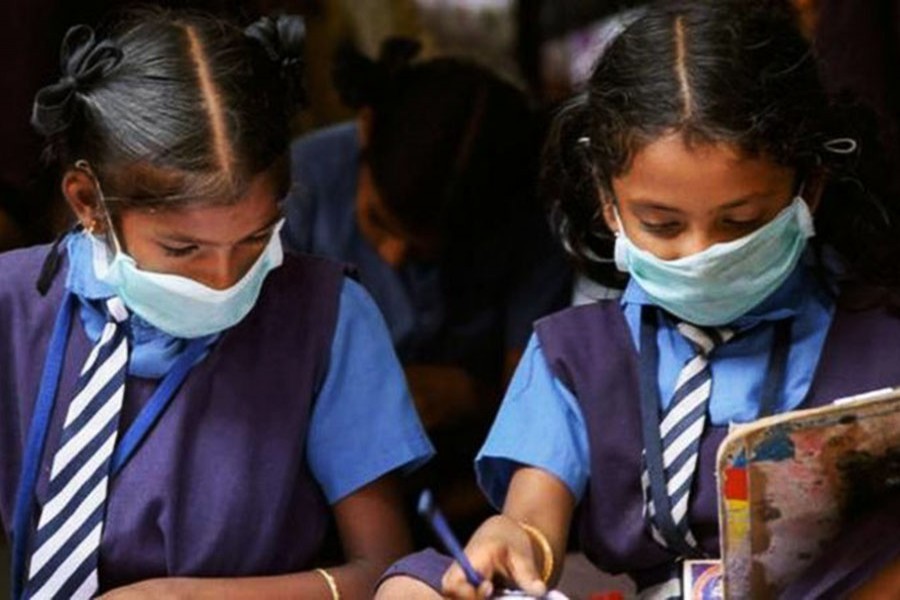
Published :
Updated :

Among the numerous shocks afflicting life and living during the ongoing pandemic, the one less spoken about -- muted perhaps by the severity of the shocks in some other aspects of people's life -- is education, more particularly academic education and learning. School closures have been a common tool in the battle against COVID-19. There was hardly any other choice as children are likely to be more vulnerable to any kind of illness of the infectious variety. Introduction of on-line learning instead of in-person presence in classrooms, though widely practised globally, did not materialise at all as an alternative to classroom learning. Over and above, the asymmetries among countries and within the socio-economic facets of individual countries were the major impediments to utilise whatever benefit online learning could deliver.
Clearly, the world has experienced an unprecedented situation, and in the academia, children being the ones to bear the brunt more acutely than older pupils, have suffered immensely that might have a lingering effect on them in the future. Although the perception of loss is well acknowledged, as of now, there is no clear picture of the loss and how to go about making up-- if that is at all a plausible proposition.
In Bangladesh schools reopened rather late than many countries. There were some here whose eyebrows were raised when the last call for closure of schools and all academic institutions was announced by the government little over a month ago. Looking at the overall situation, sensible thinking would suggest that the decision was correctly taken. The spread of the new Covid variant Omicron was sweeping across continents and there was no reason to believe that it won't be as frightening as its predecessor, Delta.
It is good news that children are back again to classrooms. The worry for them overshadowing that for the older students is obviously because those who are in college or university are relatively less susceptible to absence of physical presence as many of them can be expected to keep going with their studies at home while also trying to make up for losses. The situation with the children is altogether different as it is not only the very beginning of their learning phase that got disrupted but a whole range of life skills they learn from school has completely gone.
The loss may assume immense magnitude as many quarters including international organisations and academic experts hold the view that the loss is irreparable. A World Bank-UNESCO-UNICEF report has recently drawn a rather disheartening picture of the crisis of education worldwide. According to the report, the current generation of students risks losing $17 trillion in lifetime earnings in present value, or about 14 per cent of today's global GDP, as a result of COVID-19 pandemic-related school closures. The projection in the report is that the impact is more severe than previously thought, and far exceeds the $10 trillion estimates released in 2020. "The COVID-19 crisis brought education systems across the world to a halt," said Jaime Saavedra, World Bank Global Director for Education, adding, "The loss of learning that many children are experiencing is morally unacceptable. And the potential increase of 'Learning Poverty' might have a devastating impact on future productivity, earnings, and well-being for this generation of children and youth, their families, and the world's economies." UNICEF Director of Education Robert Jenkins has commented, "The COVID-19 pandemic shut down schools across the world, disrupting education for 1.6 billion students at its peak, and exacerbated the gender divide. In some countries, we're seeing greater learning losses among girls and an increase in their risk of facing child labour, gender-based violence, early marriage, and pregnancy. To stem the scars on this generation, we must reopen schools and keep them open, target outreach to return learners to school, and accelerate learning recovery,"
The report highlights that, to date, less than 3.0 per cent of governments' stimulus packages have been allocated to education. Much more funding will be needed for immediate learning recovery. The report also notes that while nearly every country in the world offered remote learning opportunities for students, the quality and reach of such initiatives differed - in most cases, they offered, at best, a rather partial substitute for in-person instruction. The report recommends that countries put in place Learning Recovery Programmes with the objective of assuring that students of this generation attain at least the same competencies of the previous generation. Programmes must cover three key lines of action to recover learning: 1) consolidating the curriculum; 2) extending instructional time; and 3) improving the efficiency of learning.
The report also suggests a few methods of improving the efficiency of learning. It says techniques like targeted instruction can help learning recovery, which means that teachers align their teaching methods to the learning level of students, rather than an assumed starting point or curricular expectation. Targeted instruction will require addressing the learning data crisis by assessing students' learning levels. It also necessitates additional support to teachers so that they are well-equipped to teach at the level where children are, which is crucial to prevent losses from accumulating.
There could be many approaches that may be found appropriate but all of those may not suit most countries having constraints to deploy enough resources in an effort to repair the damages. In Bangladesh although schools have reopened (for the third time) and children are apparently happy to join their peers, the major task for the government now is to work out a short-to-medium term (even long-term) plan to address the overall situation. To start with, there will be the need to assess the nature and scope of losses at various levels starting with the very beginners to those at the secondary level. We are yet to hear about any such plan.


 For all latest news, follow The Financial Express Google News channel.
For all latest news, follow The Financial Express Google News channel.